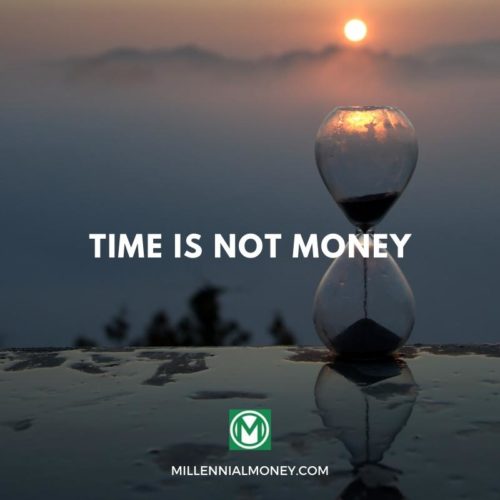So many people spend their lives only chasing money. I can see it literally and figuratively every day when I walk to my office. Blank faces, coffee in hand, bobbing and weaving past other blank faces. I used to be one of them.

Sure, it’s early in the morning, but I can guarantee that 99% of them wouldn’t be slogging to work a cold 15-degree Chicago winter morning if they didn’t have to. Most of them are commuting long distances for the money. Most of us need to work to make money. Other people pay us for our time.
But How Much Money is Enough?
I’ve asked friends, people sitting next to me at airports, and the occasional person who finds out that I blog about money this very question. I always get the same free answers. “More” “There’s never enough” “$1 million dollars”.
That used to be me. I bought into the myth of more. It was an empty way to live a life. I was told early in my career that money is a scorecard. I was also told it’s a measure of how much value you have put into the world. But neither of those are true.
How much money you have in the bank is simply how much exchange-value you possess. That’s it. Sure, you can trade it for a ton of things – even your freedom, but it’s not a measure of your value. Don’t let anyone tell you that.
How much money you have isn’t a reflection of your value.
I bought into the myth and pursuing money above all else. It is my top millennial money mistake. Looking back I sacrificed too much for it. During the 5 years it took me to go from $2.26 to $1 million in my bank account, I gave up countless opportunities. I was getting rich, but I wasn’t living a rich life.
I realized that chasing more wasn’t sustainable. I was burning out. I wasn’t connecting with my wife like I used to. I need to find how much money was really enough.
How Much Money is Really Enough?
Here’s how I determined how much was enough for me.
I started asking myself tough questions I broke into two categories.
First I needed a mirror
I encourage you to find a quiet place and write down your answers to these questions. Be honest with yourself. Also, realize that your answers to these questions will change over time.
- What kind of life do I want to live?
- What do I really love?
- What is my mission?
- What does the perfect day look like?
- What truly makes me happy?
- What do I want to be my legacy?
Since I first answered these 3 years ago, I make a point to go back them every year and update them. I now have 3 versions that show how my desires have changed. You don’t have to write a lot. Just answer each question on a piece of paper (not your phone because you might lose it) – save it in a drawer or in the cloud. Email to yourself. Whatever, just write it down.
It’s a lot easier to figure out how much money is enough when you know the type of life you want to live.
Second, I needed the number
Once I wrote down the type of life I wanted to live – each day and in the future, I just needed to figure out how much money it would cost to live that life. I started calculating what I need over a year and then I broke it down into monthly, and finally daily increments.
- How much do I need to live the life I want to live?
- How much do I need to take care of my families basic needs?
- How much money do I need to maximize my happiness?
- What is the minimum amount of money I need each month to live the life I want?
- How much money do I need to help others?
Tip: make this as tangible as possible. I like taking two big trips a year that cost about $7,000 each (for me and my wife) and I estimate that to live a normal happy life I need about $3,000 per month (includes mortgage, a few nice dinners a month, and plenty of concert tickets!). So my total is about $50,000. I’m not planning on spending over $210,000 in one year again. If you aren’t already, start tracking your spending use my favorite free net-worth tracker Personal Capital and measure what you spend each month. Multiply it by 15 to get your number (15 instead of 12 to give you a buffer).
I knew these were some of the questions that would help me determine how much is enough.
I needed a simple goal. I needed to find the amount of money that would help me maximize my happiness and do the things I love with the people I love.
Some of those blank face commuters have numbers too. A goal. Maybe it’s what they need to retire or buy the house of their dreams. Maybe they made up the number or maybe they pulled it from a retirement calculator or advisor.
Unfortunately, a lot of these numbers are too limiting. There are retirement calculators at Personal Capital that run over 5,000 simulations to determine how much money you need to weather the likely market fluctuations in the future.
But while these calculators are a great starting point. They don’t take into account who you truly are, what you care about, what you love. A number is just a number.
Easy right? Not really, but you can get pretty close. Sure, there are a ton of variables that you can’t control (future interest rates, future tax rates, future expenses, inflation), but get as close as you can. A vast majority of people can live insanely happy lives with annual expenses between $25,000 – $60,000.
How to Calculate Your Financial Independence Number
There are a number of ways you can calculate how much money you need for financial independence, but the most accurate is to multiply your expected annual expenses by 25, so it takes about $50,000 to live the life I love to live, so my number was $50,000 x 25 = $1,250,000
My calculation ended up being simple and I decided to stick to it. That was enough for me.
I made a promise to myself that once I reached $1,250,000 it would be enough for me. At that time I would no longer pursue money unless it aligned with something I’m incredibly passionate about or that aligns with the life I want to live.
I broke it down into my $50 a day early retirement strategy and hit my goal in 5 years. It’s enough.
I am still making money of course, but I love what I do and only work on what I’m passionate about.
Money is just a number unless there are dreams behind it. What’s your number? How much money is enough?





Read 21 comments or add your own
Read Comments